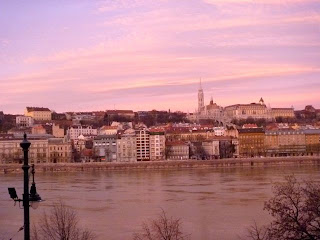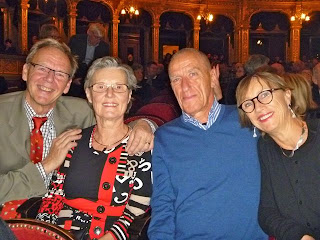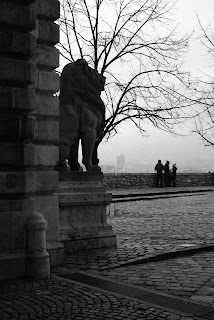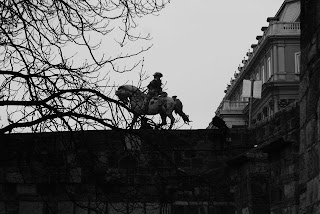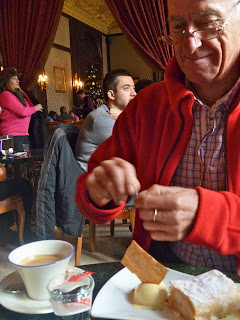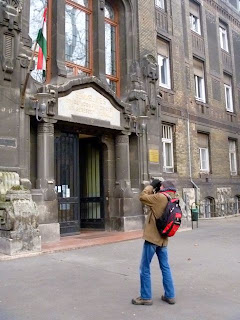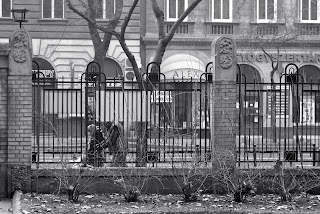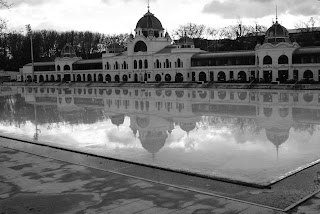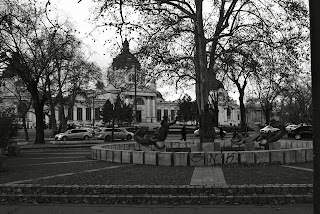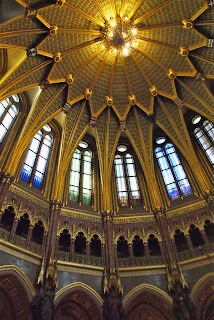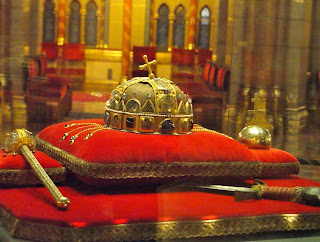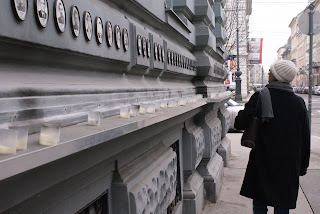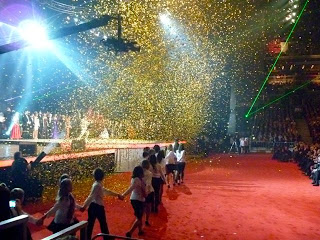It's not only weather which stops a sailor in her tracks. A stomach bug will do it too. So after freewheeling through the grand streets of Budapest, I'm now looking at the world through a very small opening.
In a very limited way, the world comes to us - Kevin has just cycled over to return a bag of borrowed books, and we've chatted about his shoulder and my guts (like any self-respecting retirees, we have our medical issues). Yesterday Ramazan was aboard all day. I lay in the aft cabin, which is as fine a sickroom as you can find, and listened to the to and fro between men at work. Occasionally conversation would take a detour and my ears would prick up. "God is giving options, Alex," I heard Ramazan say when Alex offered him the chance of a prayer break (the muezzin was calling, as usual, very insistently at midday). He explained that God forgives him if he's busy during the day. He prays when he gets home (and after he's washed the oil and grease off his body).
I like that stretchiness. Ramazan is a devout Muslim, but his customers pay the bills. Religious practice, as far as I can see (which isn't far) still has a fairly supple frame in Turkey, but people who are not devout, and don't want to be forced to live as if they were, are constantly on the lookout for signs of religious stiffening. There was furious online debate this past week in Hurriyet Daily News (which we English-speakers depend upon for our Turkish news) which reported that the Scientific and Technical Research Council of Turkey (TUBITAK) had stopped publication and sale of all books in its archives supporting the theory of evolution. Today, somewhat belatedly, TUBITAK has denied the story, calling it "black propaganda". Forsooth, it protested, it had two books in its 2012 catalogue regarding evolution. "Did their position evolve?" quipped one cheeky HDN reader.
Ramazan's a cheery soul, with a devilish snigger, and as I mentioned before in despatches, one helluva smart worker. We had him on board this time primarily to save Alex's back. We take the long ride home to Australia next week, and while it's anyone's guess what shape Alex will be in at the Sydney end of the flight, we paid Ramazan to curl HIS body up in the engine room for several hours in the sure knowledge that if Alex were to "winterise" the engine, as usual, he wouldn't be walking pain-free onto the plane in Istanbul. It's tough acknowledging your frailties as you age, but it hurts less if you can find a way around them.
The wind's howling and the sky is dark. It's not such a bad time to be bailing out of Marmaris (though don't tell that to our friends who are digging in for February and March - honestly, guys, we would if we could!). Enki is secure, we believe, on K pontoon, squeezed between Don Quixote del Mar (from Istanbul) and Sweet Spot (from Delaware - except not really). They're both big motor cruisers and their bulk, otherwise unattractive, cuts the impact of the weather. Netsel's marina staff are attentive, but we've hired someone to keep an eye on the boat while we're away. It's our home I'm talking about here. No cat to feed, thankfully, and when I give away the rosemary bush, that'll take care of the garden. You see how easy it is?
In a very limited way, the world comes to us - Kevin has just cycled over to return a bag of borrowed books, and we've chatted about his shoulder and my guts (like any self-respecting retirees, we have our medical issues). Yesterday Ramazan was aboard all day. I lay in the aft cabin, which is as fine a sickroom as you can find, and listened to the to and fro between men at work. Occasionally conversation would take a detour and my ears would prick up. "God is giving options, Alex," I heard Ramazan say when Alex offered him the chance of a prayer break (the muezzin was calling, as usual, very insistently at midday). He explained that God forgives him if he's busy during the day. He prays when he gets home (and after he's washed the oil and grease off his body).
I like that stretchiness. Ramazan is a devout Muslim, but his customers pay the bills. Religious practice, as far as I can see (which isn't far) still has a fairly supple frame in Turkey, but people who are not devout, and don't want to be forced to live as if they were, are constantly on the lookout for signs of religious stiffening. There was furious online debate this past week in Hurriyet Daily News (which we English-speakers depend upon for our Turkish news) which reported that the Scientific and Technical Research Council of Turkey (TUBITAK) had stopped publication and sale of all books in its archives supporting the theory of evolution. Today, somewhat belatedly, TUBITAK has denied the story, calling it "black propaganda". Forsooth, it protested, it had two books in its 2012 catalogue regarding evolution. "Did their position evolve?" quipped one cheeky HDN reader.
Ramazan's a cheery soul, with a devilish snigger, and as I mentioned before in despatches, one helluva smart worker. We had him on board this time primarily to save Alex's back. We take the long ride home to Australia next week, and while it's anyone's guess what shape Alex will be in at the Sydney end of the flight, we paid Ramazan to curl HIS body up in the engine room for several hours in the sure knowledge that if Alex were to "winterise" the engine, as usual, he wouldn't be walking pain-free onto the plane in Istanbul. It's tough acknowledging your frailties as you age, but it hurts less if you can find a way around them.
The wind's howling and the sky is dark. It's not such a bad time to be bailing out of Marmaris (though don't tell that to our friends who are digging in for February and March - honestly, guys, we would if we could!). Enki is secure, we believe, on K pontoon, squeezed between Don Quixote del Mar (from Istanbul) and Sweet Spot (from Delaware - except not really). They're both big motor cruisers and their bulk, otherwise unattractive, cuts the impact of the weather. Netsel's marina staff are attentive, but we've hired someone to keep an eye on the boat while we're away. It's our home I'm talking about here. No cat to feed, thankfully, and when I give away the rosemary bush, that'll take care of the garden. You see how easy it is?







